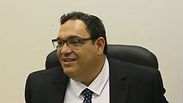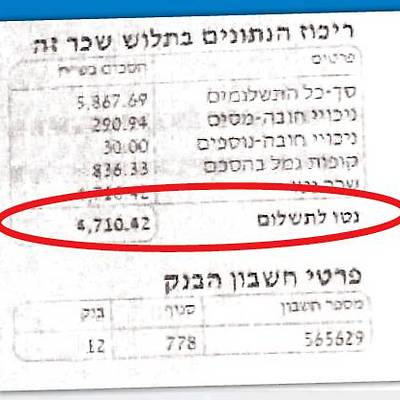
Teachers fight back, publish proof of meager salaries on Facebook
Campaign called 'Teachers on the Poverty Line' seeks to improve wages for educators; one first year teacher says his salary covers half of his rent.
This is a struggle of the young teachers, those drawn to teaching out of idealism and a sense of mission. And while they are true to their values, they find themselves cutting back repeatedly on expenses. Some have been forced to move back in with their parents, while everyone is worried about the inability to make ends meet. They knew they would not get rich by teaching, but never imagined that their wages would be so miniscule.
Related stories:
- MKs make 3.7 times Israel's average wage
- OECD: Israel has most crowded classrooms
- Teachers protest for better education
But before the need to make a decent living forces them reluctantly out of the profession, they are fighting to change the situation. Under the banner "Teachers on the Poverty Line," young educators have published their pay slips on Facebook and are calling on their colleagues to do the same.
"We decided to work together to illustrate the harsh reality and lack of fairness that there is to teachers in general and new teachers in particular," wrote the organizers of the protest.
"It's time to hold our heads up and change the system for the benefit of all teachers now and in the future. We have to break down the walls of shame - we have nothing to be ashamed of. The shame lies with the education system and the education minister who heads it."
The heart of the teachers' battle is being waged on two fronts: The primary focus is the issue of Israel's low-paid teachers, a cause for concern in the education system for many years, and which, despite a series of reforms, has yet to see any dramatic shift.
The second front is the plight of dozens of new teachers in their first year of employment, who are shocked to discover that their salary simply did not go into their account, or was only partially paid.
The Education Ministry claimed last month that this incomplete payment was due to the fact that the absorption process for new teachers had not been carried out in full. Meanwhile, some teachers are still waiting to receive their full salary, which, the protest organizers say, is a pittance anyway.
Education reforms may promise a higher starting salary (for longer working hours), but not all protesting teachers will be included in the reforms, which will ultimately still result in a low wage.
"In practice, our salary slips speak for themselves," say the teachers.
The Education Ministry said in response: "All teachers' salaries will be deposited this morning in full, without deductions. It should be noted that the payroll system is in transition, and unfortunately, pay slips do not reflect the true and full salary deposited in bank accounts. The Education Ministry is holding ongoing negotiations with the Treasury and the Teachers' Union for a comprehensive solution to the problem."
Idealistic and poor
Y. is a first-year teacher at a high school in the center of the country. He works 70% of a full-time position, ands this month he received a salary of 3,848 shekels, including 400 shekels missing from his previous salary.
"A teacher on a salary like this can't start a family," he says. "I never thought the salary would be so embarrassing. My salary is about half of my rent. Teachers can't exist and make an honorable living."
***
S. is a teacher at a high school in the center of the country. She works 55% of a full-time position and earns a monthly salary of 2,402 shekels.
"My financial situation is worrying," she says. "I have to cut back, look for special offers and give up on various items. We work so hard in order to teach, give the students tools and training for life, when an integral part of the lesson is given over to maintain discipline. There is an unfair situation at play, which is very damaging to teachers. I believe that everything stems from education and it is the most important thing, but you cannot condemn us to a life of poverty."
***
M. is a full-time teacher at a high school in the Sharon region. He earns 4,710 shekels per month.
"I decided to be a teacher out of ideology and the desire to change society," he says. "Being a teacher is a round-the-clock job, not just in the classroom. I went into it knowingly, and I enjoy working with the students, but the meager pay slip is still a blow and it hurts. At the moment I am barely keeping my head above water. I get my energy from my students, but those above me are walking all over me."
***
L. is a high school teacher in Tel Aviv. She works 50% of a full-time position. She is forced to live with her parents, and shares a room with her sister.
"I went into teaching by choice and from a desire to influence and give something back," she says. "I knew that the salaries weren’t high but I never thought it would be so bad.
"The salary is low in and of itself, but especially in light of the work that we do. I enjoy my work with the students, but I cannot buy groceries with enjoyment. We definitely live from hand to mouth. I am proud to be a teacher, but I am ashamed of my salary."











